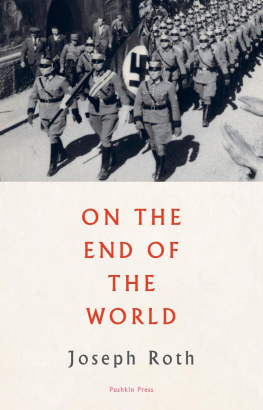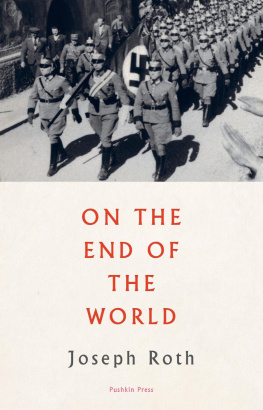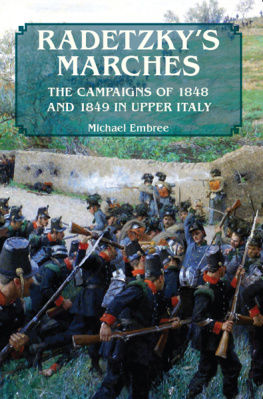Joseph Roth - The Radetzky March
Here you can read online Joseph Roth - The Radetzky March full text of the book (entire story) in english for free. Download pdf and epub, get meaning, cover and reviews about this ebook. year: 2002, publisher: Overlook TP, genre: Detective and thriller. Description of the work, (preface) as well as reviews are available. Best literature library LitArk.com created for fans of good reading and offers a wide selection of genres:
Romance novel
Science fiction
Adventure
Detective
Science
History
Home and family
Prose
Art
Politics
Computer
Non-fiction
Religion
Business
Children
Humor
Choose a favorite category and find really read worthwhile books. Enjoy immersion in the world of imagination, feel the emotions of the characters or learn something new for yourself, make an fascinating discovery.

- Book:The Radetzky March
- Author:
- Publisher:Overlook TP
- Genre:
- Year:2002
- Rating:3 / 5
- Favourites:Add to favourites
- Your mark:
- 60
- 1
- 2
- 3
- 4
- 5
The Radetzky March: summary, description and annotation
We offer to read an annotation, description, summary or preface (depends on what the author of the book "The Radetzky March" wrote himself). If you haven't found the necessary information about the book — write in the comments, we will try to find it.
The Radetzky March — read online for free the complete book (whole text) full work
Below is the text of the book, divided by pages. System saving the place of the last page read, allows you to conveniently read the book "The Radetzky March" online for free, without having to search again every time where you left off. Put a bookmark, and you can go to the page where you finished reading at any time.
Font size:
Interval:
Bookmark:
OUR SOLE REMAINING task is to describe the district captains final days. They slipped by virtually like one day. Time flowed past him, a broad, even river, murmuring monotonously. The war communiqus and the governors extraordinary decrees and directives barely ruffled the district captains mind. He would have retired long since anyhow. He remained in office only because of the war. And so at times he felt he was merely living a second, paler life, long after completing his first and real life. His days did not seem to be hurrying toward the grave like the days of all other people. Petrified like his own gravestone, the district captain stood on the brink of days. Never had Herr von Trotta so closely resembled Kaiser Franz Joseph. At times he even dared to compare himself to the Kaiser. He thought of his audience at Schnbrunn, and in the manner of simple old men who talk about a catastrophe that has struck both of them, he would mentally say to Franz Joseph, What? If only someone had told us at the time! Told us two old men!
Herr von Trotta slept very little. He ate without noticing what was put before him. He signed documents that he hadnt carefully read. At times, he would appear at the caf in the afternoon, before Dr. Skowronnek arrived. Herr von Trotta would then pick up a three-day-old newspaper and read something he was long familiar with. But if Dr. Skowronnek spoke about the latest events, the district captain would merely nod as if he had learned the news long ago.
One day he received a letter. A woman he had never heard of, Frau von Taussig, now a voluntary nurse at the Steinhof Insane Asylum in Vienna, informed Herr von Trotta that Count Chojnicki had returned from the front, insane, several months ago and that he spoke about the district captain very frequently: in his confused utterances, he kept reiterating that he had important information for Herr von Trotta. And if the district captain happened to be planning a trip to Vienna, his visit with the patient might unexpectedly restore his sanity, as had occurred in similar cases now and then. The district captain consulted Dr. Skowronnek.
Anything is possible, said Skowronnek. If you can stand itI mean, stand it easily.
Herr von Trotta said, I can stand anything.
He decided to leave immediately. Perhaps the patient knew something important about the lieutenant. Perhaps he had something of the sons to give the father. Herr von Trotta went to Vienna.
He was taken to the military section of the asylum. It was late autumn, a dreary day; the asylum was shrouded in a gray, persistent rain that had been pouring over the world for days now. Herr von Trotta sat in the dazzling white corridor, peering through the barred window at the denser and softer bars of rain, and thought of the embankment slope where his son had died. Now hes getting soaked, thought the district captain, as if the lieutenant had died only today or yesterday and the corpse were still fresh.
Time wore by slowly. He saw people shuffling by with deranged faces and gruesomely contorted limbs, but for the district captain madness held little terror, even though this was his first visit to an insane asylum. Only death was terrible. Too bad! thought Herr von Trotta. If Carl Joseph had gone crazy instead of dying in action, I would have brought him back to his senses. And if I hadnt succeeded, then I would have come to see him every day! Perhaps he would have contorted his arm as horribly as this lieutenant here that theyre walking past me. But it would have been only his arm, and you can caress a contorted arm. You can also look into twisted eyes! So long as theyre my sons eyes. Happy the fathers whose sons are crazy!
Frau von Taussig came at last, a nurse like any other. He saw only her uniformwhat did he care about her face? But she gazed and gazed at him and then said, I knew your son!
Only now did the district captain look at her face. It was the face of a woman who had grown old but was still beautiful. Indeed, the nurses coif rejuvenated her, as it does all women, because it is in their nature to be rejuvenated by kindness and compassion and also by the external insignia of compassion. She comes from high society, thought Herr von Trotta.
How long ago, he asked, did you know my son?
It was before the war, said Frau von Taussig. Then she took the district captains arm, led him down the corridor as she was accustomed to escorting patients, and murmured, We were in love, Carl Joseph and I.
The district captain asked, Forgive me, but was that foolish scrape because of you?
Partly because of me, said Frau von Taussig.
I see, I see, said Herr von Trotta. Partly because of you. Then he squeezed the nurses arm slightly and went on. I wish Carl Joseph could still get into foolish scrapes because of you!
Now lets go to the patient, said Frau von Taussig. For she felt tears welling up, and she believed that she mustnt weep.
Chojnicki sat in a bare room from which all objects had been removed because he sometimes had fits. He sat in a chair whose four feet were screwed into the floor. When the district captain entered, the count stood up, walked toward the guest, and said to Frau von Taussig, Leave the room, Vally! We have something important to discuss!
Now they were alone. The door had a peephole. Chojnicki went over to the door, covered the peephole with his back, and said, Welcome to my home!
For some unfathomable reason his bald head looked even balder. The patients large, blue, somewhat bulging eyes seemed to emanate an icy wind, a frost blasting over the gaunt and bloated yellow face and the wasteland of the skull. From time to time the right-hand corner of Chojnickis mouth twitched. It was as if he were trying to smile with that side. His ability to smile had simply lodged in that corner, abandoning the rest of the mouth forever.
Sit down! said Chojnicki. I sent for you in order to give you some important information. Not a word to anyone else! Nobody but you and me must know about it: the Old Man is dying!
How do you know? asked Herr von Trotta.
Chojnicki, still at the door, pointed his finger at the ceiling, then put it to his lips, and said, From a higher source!
Next he turned around, opened the door, cried Nurse Vally! and said to Frau von Taussig, who instantly appeared, The audience is over!
He bowed. Herr von Trotta left.
He walked down the long corridor, accompanied by Frau von Taussig, and descended the wide steps.
Perhaps it worked, she said.
Herr von Trotta took his leave and went to see Railroad Councilor Stransky. He didnt quite know why. He went to see Stransky, who had married a Koppelmann. The Stranskys were at home. They didnt recognize the district captain right off. Then they greeted him, embarrassed and nostalgic and aloof at onceso it seemed to him. They served him coffee and cognac.
Carl Joseph! said Frau Stransky, ne Koppelmann. When he made lieutenant, he came to see us right away. He was a dear boy!
The district captain stroked his whiskers silently. Then the Stransky son came in. He limped, it was unsightly. He limped quite severely. Carl Joseph did not limp! the district captain thought.
They say the Old Mans dying, Railroad Councilor Stransky suddenly said.
The district captain instantly rose and left. After all, he knew the Old Man was dying. Chojnicki had told him, and Chojnicki had always known everything. The district captain went to see his boyhood friend Smetana at the Royal Comptrollers office. The Old Mans dying! said Smetana.
Id like to go to Schnbrunn! said Herr von Trotta. And he went to Schnbrunn.
The thin, relentless drizzle shrouded the castle of Schnbrunn just as it did the Steinhof Insane Asylum. Herr von Trotta walked up the garden lane, the same lane he had followed long, long ago, to the secret audience about his son. His son was dead. And the Kaiser was dying too. And for the first time since learning of his sons death Herr von Trotta believed he knew that his son had not died by chance. The Kaiser cannot outlive the Trottas! the district captain thought. He cannot outlive them! They saved his life, and he will not outlive the Trottas.
Font size:
Interval:
Bookmark:
Similar books «The Radetzky March»
Look at similar books to The Radetzky March. We have selected literature similar in name and meaning in the hope of providing readers with more options to find new, interesting, not yet read works.
Discussion, reviews of the book The Radetzky March and just readers' own opinions. Leave your comments, write what you think about the work, its meaning or the main characters. Specify what exactly you liked and what you didn't like, and why you think so.













